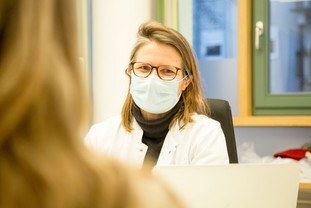TRIO study tracks down the genetic fingerprint of childhood cancers
TRIO study tracks down the genetic fingerprint of childhood cancers
At the National Center for Tumor Diseases Dresden (NCT/UCC), children newly diagnosed with cancer and their parents have the opportunity to have their genetic fingerprint determined as part of the TRIO study. If certain genetic changes are detected, the patients benefit in the form of adapted therapies or recommendations for intensified preventive care. This increases the chances of a healthy life after cancer. Cancer research also benefits from these genetic analyses: they form an important basis for investigating previously unknown genetic predispositions to childhood cancers and developing strategies for prevention. On the occasion of World Cancer Day on February 4, the NCT/UCC will provide information about the opportunities and research goals associated with the TRIO study.
The National Center for Tumor Diseases Dresden (NCT/UCC) is a joint institution of the German Cancer Research Center (DKFZ), the University Hospital Carl Gustav Carus Dresden, Carl Gustav Carus Faculty of Medicine at TU Dresden and the Helmholtz-Zentrum Dresden-Rossendorf (HZDR).
Well over 80 percent of childhood cancers can be cured today. However, the majority of patients suffer from moderate to severe late effects of intensive chemo- and radiation therapies. The goal of modern pediatric oncology is therefore not only to cure patients, but also to enable them to lead healthy lives for the following decades. An essential basis for this is knowledge of genetic predisposition - that is, changes in the genes that were either directly inherited from the parents or newly appeared before birth. This is because some of these genetic changes not only influence the risk of developing cancer, they also affect how individual patients respond to therapy and what short- and long-term side effects can be expected.
"If such a genetic variant is present, we can adapt the therapy or make recommendations for intensified screening in order to detect possible secondary diseases or severe acute or long-term side effects at an early stage and influence them positively," explains Prof. Julia Hauer, Head of the Division of Pediatric Oncology and Hematology at the Department of Pediatrics and Adolescent Medicine at the University Hospital Carl Gustav Carus Dresden and Head of the "Genetic Predisposition" research group.
The genetic fingerprint of the family trio consisting of the sick child, mother and father also provides the research team led by Prof. Hauer with important information for investigating previously unknown genetic alterations for a possible direct connection with the cancer. The scientists want to use the increasingly precise understanding of genetic predisposition, among other things, to develop strategies for the prevention of childhood cancer. In this context, the interaction with external environmental influences is also important. "For leukemias, for example, we are investigating the extent to which infections in combination with specific genetic predispositions can promote the actual onset of the cancer. Certain vaccinations could then not only protect against the respective infection, but also have an additional preventive effect against cancer," says Prof. Hauer. "Acute leukemias are the most common cancers in children. Being able to take preventive action here would be an important step for pediatric oncology," emphasizes Prof. Martin Bornhäuser, member of the Executive Board of the NCT/UCC and Director of Medical Clinic I at Dresden University Hospital.
In the TRIO study, a specific part of the genetic material ("exome") is analyzed, which contains information about the structure of proteins - about 85 percent of all known disease-causing genetic alterations are found here. The sequence of important building blocks of the genetic material - the "bases" - shows an individual pattern in each person, with specific deviations. In rare cases, changes in the sequence of bases can increase the likelihood of developing cancer or influence the response to therapy. The scientists want to specifically identify these changes in the TRIO study.
The examinations as part of the TRIO study can currently be offered to all children newly diagnosed with cancer who are treated in the Department of Pediatrics and Adolescent Medicine at Dresden University Hospital. A good 90 percent of those affected have so far taken advantage of the offer, which has been available since 2019. Genetic testing is always performed on the parents as well. If a relevant genetic change is detected, healthy siblings can also be tested. Through a cooperation, participation is also open to patients of Chemnitz Hospital. A similar offer exists at the University Hospital Düsseldorf, where Prof. Hauer worked until 2019.
Patients from other sites who are interested in TRIO sequencing can present themselves at the oncological second opinion consultation of the Clinic for Pediatrics and Adolescent Medicine at Dresden University Hospital (Pediatric Oncology House 65, Tuesdays 2 to 4 p.m., registration: Ms. Noack Tel. +49 (0)351 458-3522 or -18134). The genetic examinations have so far not been financed by health insurance companies, but have been made possible by donations from Sonnenstrahl e.V., "Menschen für Kinder e.V.", "Tour der Hoffnung", "Mitteldeutsche Kinderkrebsforschung" and the "Stiftung Hochschulmedizin Dresden". However, current plans envisage TRIO sequencing being included in the guidelines for the treatment of childhood leukemias in the future. Then the genetic examination could be offered to all affected persons throughout Germany.
Press contact:
Dr. Anna Kraft
Nationales Centrum für Tumorerkrankungen Dresden (NCT/UCC)
Presse- und Öffentlichkeitsarbeit
Tel.: +49 (0)351 458-5548
E-mail: anna.kraft@nct-dresden.de
www.nct-dresden.de



